Blog
From Costa Rica to Yale
Had an amazing few days in Costa Rica last week, and back now at Yale, New Haven. The blossoms have gone and the tree-line streets are lush and green. The bicycle path I ride each day stretches for a hundred miles, through extra-ordinary countryside, and many different kinds of suburbs. Costa Rica was beautiful – I could see myself living there, for sure. The highlight was visiting the Earth Charter Institute at the University of Peace – so similar to the Sustainability Institute. Moves already afoot to work closer with them. Also nice discussions with United Nations Environment rep about getting our time involved in a new national planning initiative for the Caribbean island of Guyana.
Lorenzo Fioramonti may be Minister of Economic Development in Italy
This morning I received this extra-ordinary email from my colleague Prof Lorenzo Fioramonti who has up until now headed up the Centre for Governance Innovation at Pretoria University:
“Dear WE-Africans:
as many of you will have seen through social networks and mainstream media, I have just been elected to parliament in Italy, where I’ve just relocated (my family will follow in July). I’m now also running for the post of Minister of Economic Development on a post-GDP ‘wellbeing’ political agenda, which is becoming massively mainstream. It is incredible how fast our ideas are gaining ground and the party I have been running with, the 5 Star Movement, has fully endorsed my vision of a wellbeing economy as opposed to the conventional growth-centric model. With such a policy programme, we have won 33% of the votes and have become Europe’s largest party, on par with Angela Merkel’s.
I will be on leave from UP until 2020 and then we’ll see what happens. I think that the success of our ideas is evidence that we need to keep pushing for a radical shift all over the world, especially in Africa.
A big hug,
L.”
Starting my sabbatical at Yale today
I started a 6 month sabbatical at Yale today! Wow, I have dreamed of something like this for years and years, and somehow never taken a proper sabbatical. I will return to Stellenbosch for a few weeks of teaching in August, but should be here almost continuously until mid-October. I am hosted by the Yale Institute for Biospheric Studies (YIBS) and they do not expect me to do anything other than deliver the annual Bass Lecture in April. My aim is to write a book provisionally entitled Just Transitions in a Complex World: Reflections of an Enraged Incrementalist. I want to build a theory of change that is commensurate with a widely held view that we need radical structural transformation to address the polycrises we now face. However, when you look at what people actually do to bring this about, it is primarily about facilitating multiple dialogues between stakeholders. There is something incommensurate about the depth of radical change we think is needed and the somewhat anemic practice of facilitating dialogues. We no longer believe in revolution, and yet we have not fully conceptualised what radical incrementalism really means. While revolution creates the delusion that on the morrow of ‘seizing power’ it becomes possible to impose structural change, facilitating dialogues creates the delusion that talking is good enough to engender structural change. What seems to be missing is an appreciation of what Roberto Unger has called radical incrementalism – the increasingly large number of experimental practices that seem to be coalescing into a transformative force that lacks a coherent sense of directionality and identity. Granted, some of these are more radical than others, but often it is difficult to tell what the outcome of any given experiment is likely to be. This is what I would like to address via a wide range of discussions that will characterise each chapter. A key part of this exploration is going to be a thematic discussion of rage. While writers like Mishar in his book Age of Anger follow a long mainly Western tradition of fearing the power of rage (by psychologising, pathologising and spiritualising it), from Fanon, to Sloterdyk, to the Nigerian feminist novelist Adichie, rage can be a positive force. However, rage is usually associated with the revolutionary, and the incrementalist is regarded as tame and marginal when it comes to radical change. But can we conceive of an enraged incrementalist? Maybe the most radical person in the room is not the revolutionary who calls for the seizure of power (whatever that may mean in practice), but rather the person who asks ‘What is the next step?’ …. I’m so looking forward to exploring this core set of ideas – certainly hope I don’t get lost as I wind my way through them.
Class of 2018 has arrived ….. and its a force of nature!
The Class of 2018 has founds its way to the Sustainability Institute and the Lynedoch EcoVillage. It is our largest class since we started in 15 years ago, with a total of 58 registered! 40 out of the 58 are women, which means there are more men this year than last year. Just under 50% are black (28) and the remainder are white, even though over 60% of the original group offered positions were black. There are more black students who do not show up for registration than white students because of lack of finances for fees and accommodation. There seems to be an uptick in the number of people from the public sector, after many years of decline – total of 12 out of 58, with the remainder from the private sector (21), non-profit sector (5) and 17 full-time students (our highest ever). Interestingly, 37 out of 58 are doing the degree full-time, which I also think is the highest number to date doing the degree full-time. There 9 non-South African students – 2 Brazilians, 2 from Lesotho, 1 Namibian, 3 from the USA and 1 Zimbabwean. For the first time ever there are no East Africans, which has got a lot to do with the unwise decision to significantly increase the fees for non-South Africans, coupled to the usual problems of getting study permits in time. In general, our University system is unfriendly for non-South African Africans, which is tragedy. This year we included a new process during orientation which was to ask everyone to think of the question they are bringing to the course, and then to mould in clay a symbolic representation of their question. I have included a few pics of some of these, especially for the benefit of past students.
Masters students present their completed work next week
The most exciting moment in the academic year is upon us again: next week the students who have completed their masters research will present their completed research to the academic staff and to the masters students who are commencing their respective research projects. Attached is the detailed programme. Visitors are welcome to come listen to this cutting edge research by a new generation of sustainability researchers. Topics include the following:
Nomandla Bongoza: Education for Sustainable Futures: an approach for early childhood development
Karen Koen: Creating shared value in corporate South Africa
Tasneem Steenkamp: Spatial transformation in practice: the case of the Two Rivers Urban Park, Cape Town
Elzette Henshilwood: Exploring sustainable urban mobility transitions in Cape Town
Therese Luyt: Domestic Waste Flows in Cape Town
Olive Zgambo: Food system transformation in Cape Town
Angela Coetzee: Free range chickens in the Western Cape
Amy Giliam: Agroecology training of smallholder communities in Mopani, Limpopo
Megan Lindow: The art of storytelling with food innovators in the Western Cape
Jeeten Morar: Development impact of the REI4P in SA’s small towns
Fezeka Stuurman: Black woman owned businesses in the renewable energy sector
Andre Troost: Exploring strategic investments in mini-grids in Sub-Saharan Africa
Elijah Sichone: Exploiting renewable energy opportunities through integrated regional power systems: analysis of institutional perspective of barriers in Southern Africa
To download the programme:Colloquium invitation 2017
Centre for Complex Systems in Transition – two years on
Yesterday the core CST research team met to reflect on how far we have come since our first strategic retreat in about March 2015 which took place in Stanford. We met for most of the day and one of the issues discussed was progress towards achieving one of our goals, namely the founding of a ‘Stellenbosch School of Thought’. Two major papers have recently been completed by core staff, one on Complex Adaptive Systems by Rika Pelzer, Oonsid Biggs and two colleauges from the Stockholm Resilience Centre (SRC), and the other on transdisciplinary case study research by John van Breda and myself. These papers bring together a decade of thinking within their respective fields. They provide the foundation stones for what we are calling the ‘Stellenbosch School of Thought’ – the first being our conceptual framework, and the second our methodological framework. These two, plus a set of thematic areas (cities, food, socialecological systems, governance, cell systems, entrepreneurship, complexity and systems dynamics) constitute the building blocks of a ‘Stellenbosch School of Thought’. It was incredibly inspiring to work through all these conceptual, methodological and thematic issues, and to see how much progress we have made. I am also amazed by our impact locally, nationally and globally. We decided to try write a journal article with contributions from everyone followed possibly by an edited collection.
Eve Annecke’s take on the Lynedoch EcoVillage – a portrait of beauty and hope
Mncebisi Jonas, Desta Mebratu and me at the Conference on Towards a Human-Centred Sustainable Economic and Social Systems for the 21st Century
As I said last Thursday during a session where we three were the speakers, it was a privilege to speak with two of my mentors – Desta Mebratu, from Ethiopia, who wrote a paper in 1998 on Sustainable Development that has been compulsory reading for all my students for the introductory module of the Masters in Sustainable Development for the past 16 years! And Mncebisi Jonas has since the 1980s been the model of what true South African political activism and leadership is all about – and as I told the conference, this was the man who, when he was Deputy Minister of Finance, refused a bribe of $60 million to sell the National Treasury to the corrupt power elite that has captured South Africa’s state institutions. He lost his job in April 2017.
Towards a human-centred sustainable economic and social system for the 21st Century
From 10-12 May (next week), my research centre is hosting the 14th international colloquium of a network of progressive economists who have been collaborating for some years to develop a new economic theory appropriate for the world we currently live in. The colloquium is co-convened by the Centre for Complex Systems in Transition, University of Brasilia and World Academy of Art and Science. Click on the link below to access the programme for the colloquium. If you want to attend, please contact Vanessa on vanessa.vonderhyde@gmail.com
Human potential, reconnecting to nature and the feminine
In writing a paper with a colleague who has strong views on economic and social issues but not about ecology and patriarchy, I wrote this message to him: “This is an old debate between us, and I am happy for it to continue. But in my view the idea of human potential and social power that really energises your imaginary is only possible when humans reconnect to all life. We agree on one thing strongly: the crisis is a crisis of perception which, in turn, is rooted in human consciousness. We agree that human potential is an untapped resource that could transform the world. However, in my view there are two preconditions for this to happen: we as humans need to reconnect to nature, and we have to free ourselves from patriarchy. Both go back to the witchburnings which was the final assault by the church on a very very long history of balance between the feminine and masculine principle, with women celebrated as the origin of fertility across many cultures. The witchburnings broke the power of women in society, and established the male principle of control over the feminine principle of care. This, in turn, made it possible to define bodies and nature as objects to be controlled by men endorsed by the church. Without this, the industrial revolution would not have been possible, albeit some time later. The industrial revolution was premised on the violent disconnect from nature – the enclosure movements, colonialism as outright robbery of the land from the local people, destruction of 50% of the forests that existed at the start of the agricultural revolution, pollution of the atmosphere to the point that it is causing destructive warming. Hillman correctly argues that until we learn to see nature as beautiful, we will never fall in love with it enough to protect it. We see it as an object, much like women’s bodies are still depicted as objects. Deep ecology is about re-establishing a spiritual connection to nature as a means of liberating our true human potential. Your emphasis on human potential and social power is spot on, but without reconnecting to all life forms – both human and non-human – that potential cannot be fully unleashed. We cannot realise our potential if all around us there is genocidal destruction of non-human life on a scale not seen for hundreds of millennia. Scientists talk about the 6th great extinction, which could very well include us within the next 5 decades if this continues. This affects us deeply at a pychic level, and systematically subverts and destroys our humanity. We recover our humanity when we reconnect to nature and transcend patriarchy: both are about re-enchanting the world of inter-subjectivity where nothing is an object (not nature, not women’s bodies, not the bodies of labour) and everything is a subject. That is where the bulk of natural science has ended up, and it is where social science needs to end up. But alas, I still have not effectively articulated what I want to say about the relationship between reconnecting to nature and the realisation of human potential. I think, to put it bluntly, what kills human potential is the way knowledge legitimises turning certain humans and nature into objects which, in turn, is necessary to justify control of them. I live in a racist society – black bodies are assumed to be objects, and therefore many assume (and not just white people) that black people are not really people. This is patently wrong and objectionable. But the same applies to women’s bodies – not objects of labour like black bodies, but sexual objects. And so women, like black people, feel dehumanised in our society. Same with nature: we have a body of so-called scientific knowledge that defined nature as objects to be studied – as Francis Bacon described scientific experimentation it was, in his words, about ‘torturing her secrets out of her’ – he was a supporter of witch burning, and regarded nature as a women, and scientific experimentation as akin to torture, which he regarded as a good thing. Herein lies the origin of seeing nature as object, so it can be controlled and exploited, not appreciated and loved as something beautiful. Human potential is profoundly about recognising that I cannot be controlled and conditioned because I am not an object. I am a subject, and therefore author of my destiny. But this applies to me, to women, to black people, and to nature – all life! I can only celebrate and realise my own human potential and realize all my subjective powers if I accept I am part of a much wider web of life where NOTHING is an object – the web of life is a community of interconnected subjects whose existence is profoundly relational. That feels a bit better – I think I have said what I wanted to say.

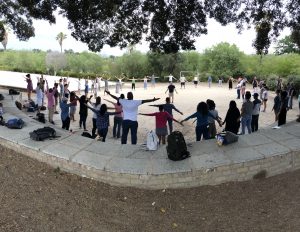



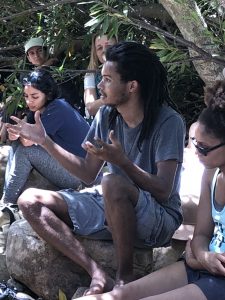






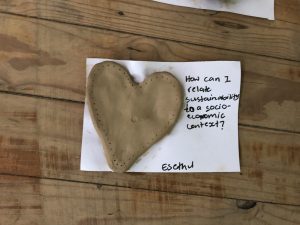


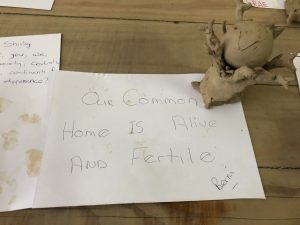

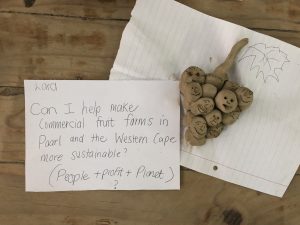

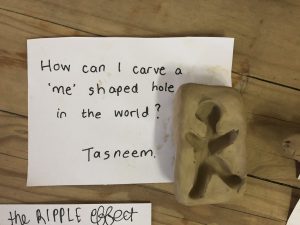
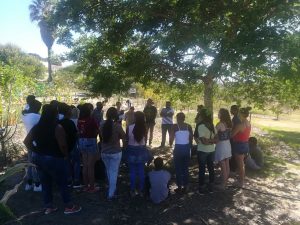

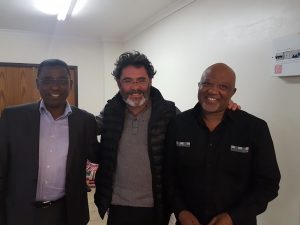

Recent Comments